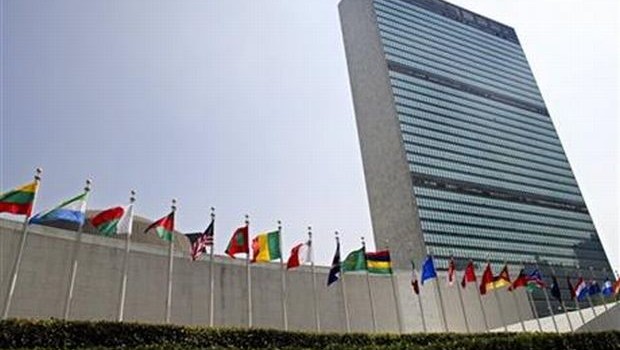
FILE – In this Sept. 13, 2005 file photo, the flags of member nations fly outside the General Assembly building at the United Nations headquarters in New York. (AP Photo/Adam Rountree, File)
The UN General Assembly overwhelmingly approved the treaty on April 2. It will require countries that ratify it to establish national regulations to control the transfer of conventional arms and components and to regulate arms brokers, but it will not control the domestic use of weapons in any country.
What impact the treaty will have in curbing the estimated $60 billion global arms trade remains to be seen. The landmark UN treaty will take effect after 50 countries ratify it, and a lot will depend on which ones ratify and which ones don’t, and how stringently it is implemented.
The United Nations has organized a high-level signing ceremony at UN headquarters on Monday – a sign of the treaty’s global importance – and several dozen countries are expected to sign, the first step to ratification.
The Control Arms Coalition, which includes hundreds of non-governmental organizations in over 100 countries that promoted an Arms Trade Treaty, said it expects many of the world’s top arms exporters including Britain, Germany and France to sign alongside emerging exporters such as Brazil and Mexico. It said the United States is expected to sign later this year.
The coalition noted that more than 500,000 people are killed by armed violence every year and predicted that “history will be made” when many UN members sign the treaty, which it says is designed “to protect millions living in daily fear of armed violence and at risk of rape, assault, displacement and death.’
Many violence-wracked countries including Congo and South Sudan are also expected to sign. The coalition said their signature – and ratification – will make it more difficult for illicit arms to cross borders.
The treaty covers battle tanks, armored combat vehicles, large-caliber artillery systems, combat aircraft, attack helicopters, warships, missiles and missile launchers, and small arms and light weapons.
It prohibits states that ratify it from transferring conventional weapons if they violate arms embargoes or if they promote acts of genocide, crimes against humanity or war crimes. The treaty also prohibits the export of conventional arms if they could be used in attacks on civilians or civilian buildings such as schools and hospitals.
In considering whether to authorize the export of arms, a country must evaluate whether the weapons would be used to violate international human rights laws or employed by terrorists or organized crime. A country must also determine whether the weapons would contribute to or undermine peace and security.
In addition, the treaty requires countries to take measures to prevent the diversion of conventional weapons to the illicit market.
